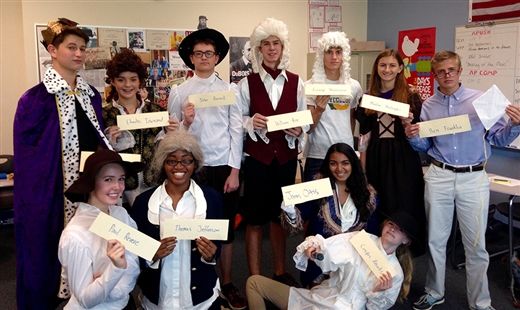

Historical Meeting of the Minds
Source/Author: Kurt Wahlgren, US History Teacher
September 24, 2015
AP U.S. History Classes held a "Meeting of the Minds" to discuss important issues from the time of the American Revolution. Here’s what the Upper School students thought of the project:
“During the meeting of the minds we discussed the main conflicts between the colonists and British a few years before the revolution. Jordan did a good job as being King George. I got to see the Loyalist point of view and the Patriot point of view during the discussion. This meeting definitely opened my mind to fully understand more ideas [of historic people] like Thomas Paine or John Adams." - Drew H
“During the debate, we mainly discussed the impact Britain had on the colonies, particularly taxes, social issues, and independence. The colonies were against any policies and acts imposed on them from Britain, while the King tried to explain that the policies are there for a reason. For example, in the Boston Tea Party, the tea was less expensive for the colonists, but they didn't want the tea because it was from Britain and they thought it was a trick. On independence, most people didn't want independence at first, but soon realized they weren't going to get fair representation in Parliament and they needed to separate. I thought it was a good experience, hearing from all the different sides and opinions that you might not get to see if you were just reading about it.” - Hannah B
“Our American Revolution debate consisted of most - if not all - of the important revolutionary or British figures from the time period around 1774. Depending on which historical figure we chose, we had to prepare a debate strategy either for or against the termination of the British-American relationship. There were also figures who were on one side but were more focused on the effects of the big picture, such as the preservation of basic human rights or the repercussions Britain might take on the colonies. From this debate, I learned how much controversy there truly was over the Intolerable Act and Quatering Act. The colonists were outraged because they believed they were being deprived of their rights as humans, but in reality they were paying a third of the taxes citizens in England were paying but still wanted the full rights as Englishmen. I also learned that some people that I thought were clearly on one side actually had a more complex opinion, such as Benjamin Franklin, Thomas Paine and John Adams.” - Cai B
























